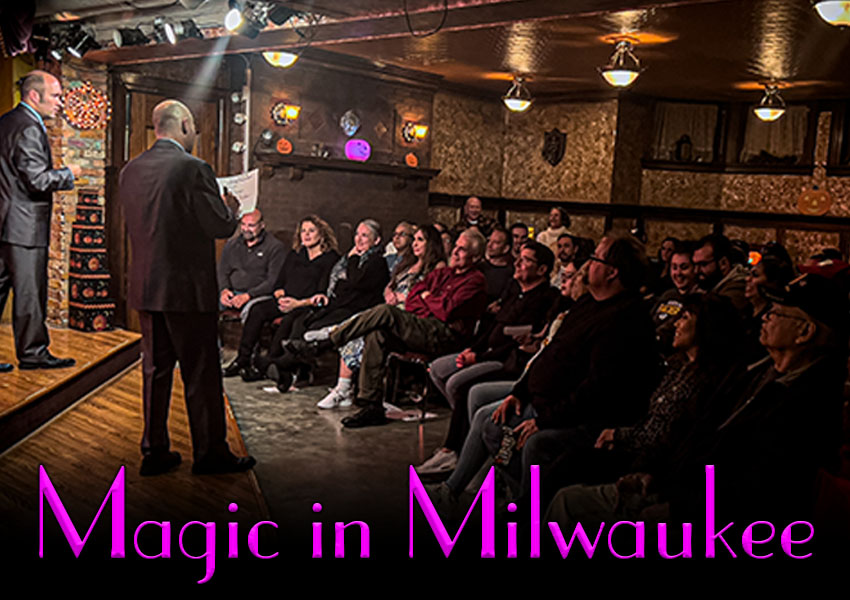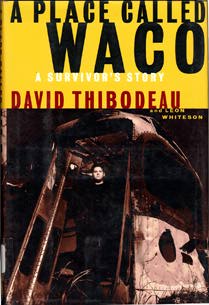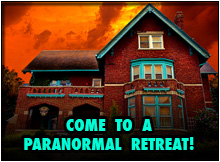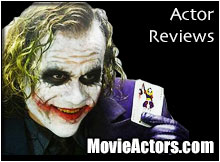Elvis Death Coverup
— CoverUps.com
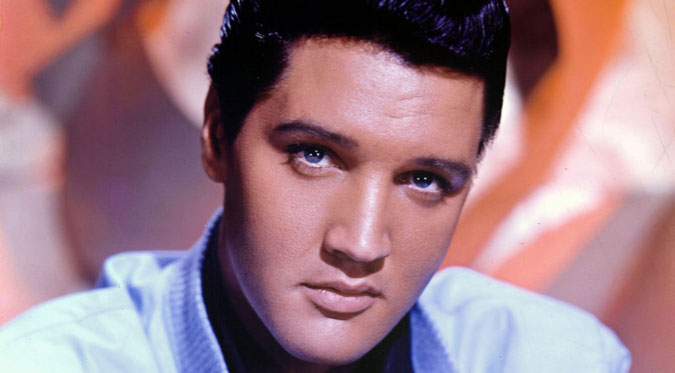
Since the day Elvis Presley was pronounced dead of a drug overdose on August 16, 1977, rumors and conjecture have alleged that he is still among the living, even to this day — motivated by his desire to escape his own oppressive and extreme fame.
By Matt DeReno
CoverUps.com Staff Writer
Introduction
Or is it just that some Elvis fans can’t let go? Is there truth to the persistent rumors that he faked his own demise to recover the privacy and peace he lost when he became a star? CoverUps.com takes a look at the King, his legend, and the enduring mystery of his death. Was there a conspiracy behind it?
Humble Beginnings
Elvis Presley was born in Tupelo, Mississippi on January 8, 1935. His family lived in near poverty during his childhood. Elvis was reared as an only child (his identical twin brother was stillborn) and was very close to his mother.
It was his mother who encouraged Presley to buy his first guitar, instead of the rifle that was his heart's desire. But once he had his guitar, he was rarely seen without it.
The Presleys attended the Assembly of God church, which was later to have a large influence on his music and the unique sound he would become famous for.
As Elvis got older, he would play music anywhere he could, gradually making a name for himself in Memphis along the famed Beale Street. The blues legend B.B. King even recalls Elvis “hanging around” before he became big.
Rise to Fame
Stardom was far from a slam dunk for Elvis in the beginning. Most music producers at the time didn't think his “sound” was marketable. He was, after all, a white man playing "black" music, and many producers thought that made him unattractive to listeners of either ethnic persuasion (it turns out just the opposite were true). A tipping point did come though when his mixture of black gospel sounds and rhythms, and provocative hip-gyrating performances, flashed over, bringing him fame in an astonishingly short time. The rest, as they say, is legend.
As he gained in popularity, Elvis acted in movies (many of them blatant vehicles to promote his music) and performed live concerts nationwide. His live concert in Hawaii was the first concert to be broadcast via satellite, and it reached an estimated one billion people. Many musicians today credit Elvis as their inspiration to pursue music as a career. John Lennon was reported to have said, “Without Elvis… there would be no Beatles.”
But as Elvis became more and more famous, he also became increasingly withdrawn. He learned the hard way that there's an emptiness to fame; it was something he could not quite come to terms with, and it would ultimately prove to be his undoing. He turned to drugs (which he'd experimented with in the army) in search of solace.
Trouble
Presley divorced his wife Priscilla Beaulieu in 1973, and grew increasingly isolated and overweight. His drug use took a heavy toll on his health, mood and stage act.
Despite these highly visible problems, Presley could still give great performances — and the numbers back this up. His concerts were always sold out and his records continued to generate hits despite the divergent path contemporary music scene took, with new artists like the Rolling Stones, Janis Joplin and Led Zeppelin becoming the new icons of popular culture.
Over time though the pressures of fame mounted without mercy on Elvis. He grew obese. He dieted obsessively and then binge ate. Eventually all desire to keep himself physically fit disappeared.
He gave his last stage performance in Indianapolis, at the Market Square Arena, on June 26.
Early Death
At the age of 42, Elvis was discovered face down on the floor of a bathroom at Graceland, at 2:30 p.m. on August 16. He was last seen earlier that day playing racquet ball with members of his entourage. According to the medical investigator, he had "stumbled or crawled several feet before he died." He was officially pronounced dead at 3:30 p.m. at the Baptist Memorial Hospital. Cause of death was listed as heart disease, but many speculated that the sheer amount of prescription drugs in his body — at least 10 were detected — had to have played a sizable role.
His funeral was a national media event
Hundreds of thousands of fans, press and celebrities, lined the streets hoping to see the open casket in Graceland or to witness the funeral.
Or Was His Death a Hoax?
Many suspicious facts surround his final days, and for many years fans claimed he was still alive (and some persist in that fact to the time of this article's being written) and had retreated from public view. If so, his death is one of the all time great CoverUps. Read on for some of the more popular theories that support his death as a hoax.
Elvis joined the Witness Protection Program
Elvis had a famous meeting with President Richard Nixon. According to some sources, Nixon issued Elvis Presley a DEA badge. Bizarrely, Elvis was said to have presented Nixon with a hand gun as a gift.
Was this a clue that Elvis was helping investigators with a major case and later was forced to enter the federal witness protection program? It seems highly unlikely.
Weird looking photos of the corpse
In 1977, the National Enquirer allegedly paid a third cousin of Elvis to smuggle a camera in to his funeral viewing to snap a few photos. The pictures raised questions: Elvis's eyebrows, his chin, and his fingers all looked unlike Elvis. Then again, dead guys often don’t look the same as they did in life.
Was there a wax dummy in the coffin?
Other sources say the coffin weighed 900 pounds. Elvis is known to have been overweight at the time of his death, but he wasn’t that big. The theory here holds that the weight was due to the presence of an air conditioner installed inside to keep the wax dummy of Elvis from melting.
The misspelled name on his tomb
Some say Elvis’ father, Vernon, misspelled Elvis’ middle name on the grave: "Aaron" instead of “Aron” — as his mother named him. But was this instead a sign that Vernon Presley knew his son was alive and not in the tomb, and the misspelling was a symbolic way of recognizing that? Then again, existing evidence suggests there was confusion as to the proper spelling of his middle name prior to his death.
The bizarre quote of Colonel Tom Parker
Elvis’s manager, Colonel Tom Parker, said in a press conference shortly after his death: “Elvis didn’t die. The body did. We’re keeping up the good spirits. We’re keeping Elvis alive. I talked to him this morning and he told me to 'carry on.’”
Should we take the Colonel literally?
New recordings from the '90s?
In 2000, an independent label released a CD entitled “Kingtinued” featuring “the voice of Elvis.” In it, at least fourteen well-known songs are crooned by the voice, allegedly an exact match to that of Elvis. However, Tears in Heaven, La Vida Loca, Sweet Home Alabama, Have I Told You Lately, and Candle in the Wind were not written and did not exist prior to August 16th, 1977. So how could it be The King?
Not so says the producer of the record, who credited Doug Church as the “voice of Elvis.” But that didn't stop some conspiracy buffs from claiming they had compared the voice on Kingtinued to a sample of Elvis’ original recordings and found it to be an exact match and thus truly the King singing incognito. You be the judge. Buy the record on Amazon.
Inconsistencies surrounding the death
The circumstances of death are described by different people in different ways. Witnesses disagree as to how the body was found and what Elvis was wearing, when the body was found, whether he was already dead, when death was declared, and what techniques were used to resuscitate him. Was the mix of drugs in his system the culprit or was it coronary artery disease? The accounts vary.
Other weird behavior
| • |
Elvis did not order new costumes for a new tour that was slated to begin on August 16th, 1977 |
| • |
He fired several old friends shortly before his death. Was it because of a book they wrote about him? |
| • |
On his last tour he sang Blue Christmas although it was summer |
| • |
Allegedly, five months before Elvis's death, family members were abruptly cut out of his will. Did he realize he needed that money as a resource to live incognito? |
Mysterious “Jon Burrows” leaving Memphis
One day after Elvis’s death, a ticket to Buenos Aires was purchased at a Memphis airport. The buyer supposedly looked a lot like Elvis and used the name “Jon Burrows.” It was the same name Elvis often used when he made hotel reservations on tour.
The CoverUps.com Conclusion
Elvis Presley continues to be an enduring American icon who transcended being a mere musician. His death, while arriving prematurely, cemented his status as a legend. But, what if Elvis wanted out of the life he'd created for himself and found intolerable? What if he thought faking his own death was the best way to do solve his dilemma? There is plausibility in these questions.
He was tired, overweight, and according to many observers displeased with the direction his career was headed. He had reason to disappear from the public eye. If so, why not just quit? Why not lay the guitar down and slip back into the fold of everyday life? After all, time would march on and new music stars would take the limelight.
Until it is proven that the body entombed in Graceland is not that of Elvis, we can never know. But one thing is beyond a doubt: Elvis was a once-in-a-lifetime musician who took rock and roll in a whole new direction. His legacy is perhaps as great as any in the annals of American pop culture and rock and roll. In that sense Elvis is indeed alive, and probably always will be.
References
Last Train to Memphis: The Rise of Elvis Presley
by Peter Guralnick
Careless Love
by Peter Guralnick
Elvis: The Last 24 Hours
by Albert Goldman
Elvis and Me
by Priscilla Presley
ElvisPresleyNews.com
ElvisLives.net
PHOTOGRAPHS
Hover your mouse over the pictures below for captions.
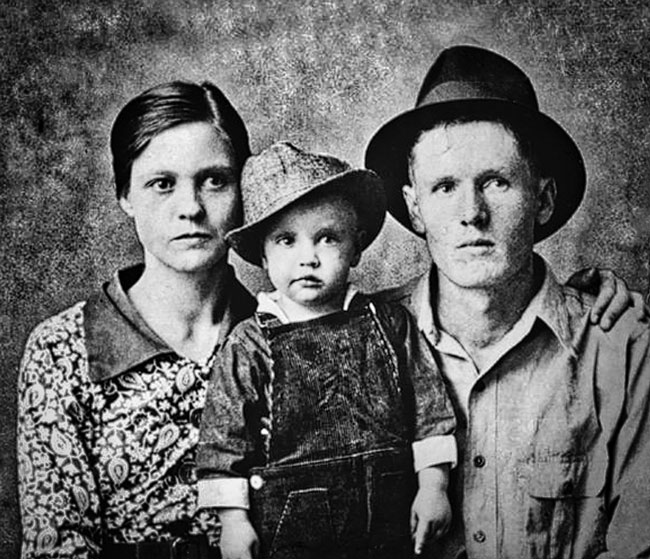
Gladys, baby Elvis, and Vernon Presley:
poverty-stricken nobodies in 1937.
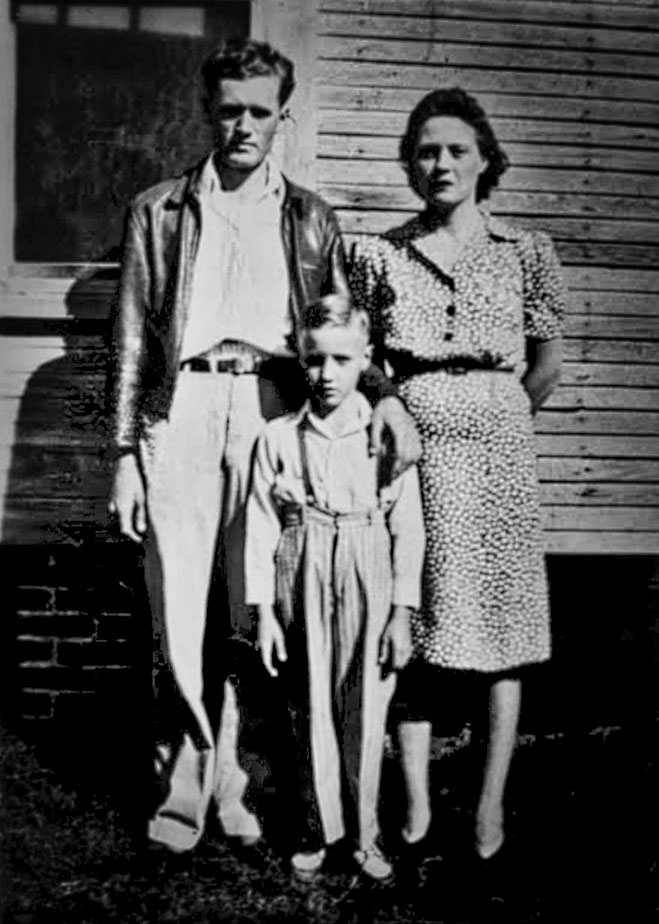
Elvis Presley and his parents,
Vernon Elvis and Gladys Love, in 1943.
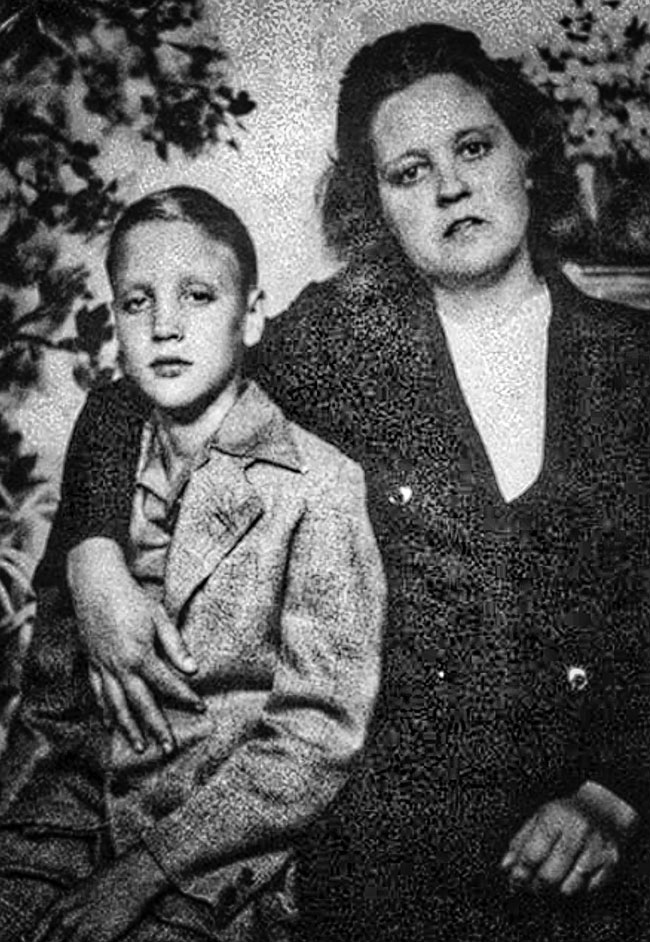
Elvis and his mother, 1948.
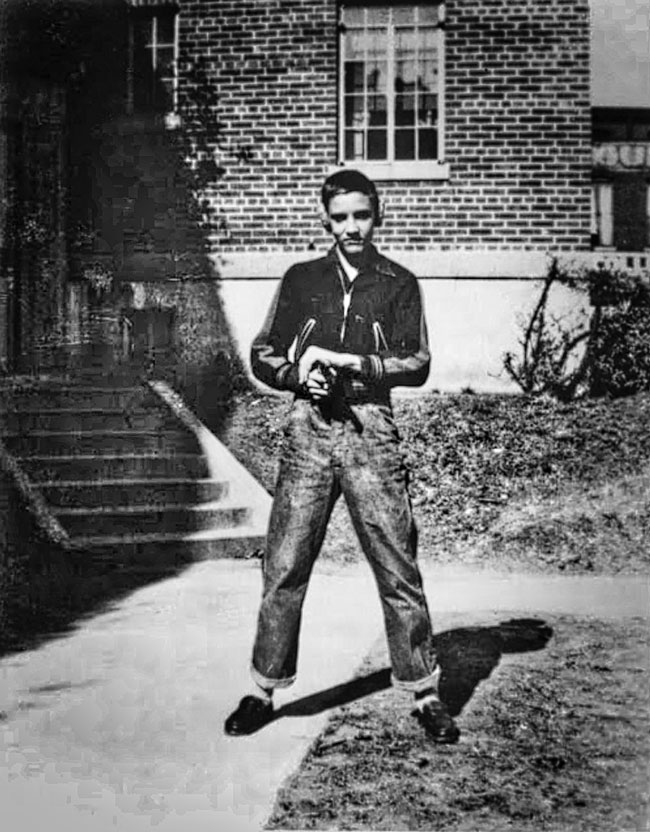
This 1949 photograph shows hints that Elvis possessed
the kind of physicality that could enthrall an audience.
It also shows Elvis doing something unthinkable to high school students in today's culture: pointing a gun at the camera
on school premises.
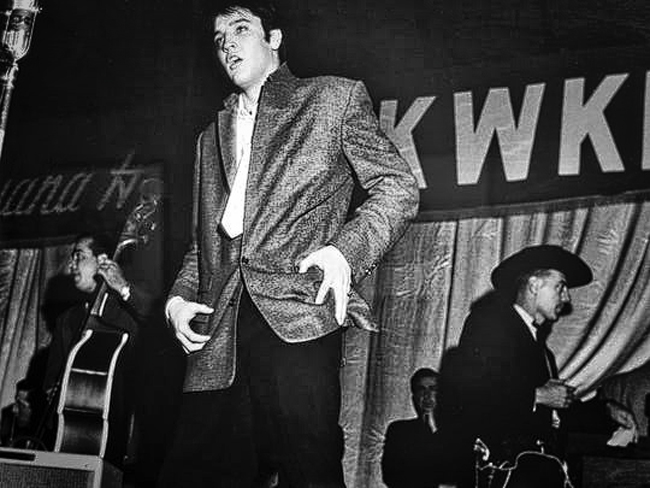
When a 19-year-old Mississippian named Elvis Presley made his first appearance in Shreveport at the Louisiana Hayride program in the Municipal Auditorium in 1954, hardly anyone knew who he was. He soon became a contract performer for the Hayride, a radio country music show. He played in Shreveport many times over the next year and a half. In that time, Elvis demonstrated a gift for triggering hysteria. “His appearance on the stage… set off what was undoubtedly one of the finest displays of mass hysteria in Shreveport history,” a reporter for the Times wrote the day after one performance. This set the pattern for the rest of Elvis's life.
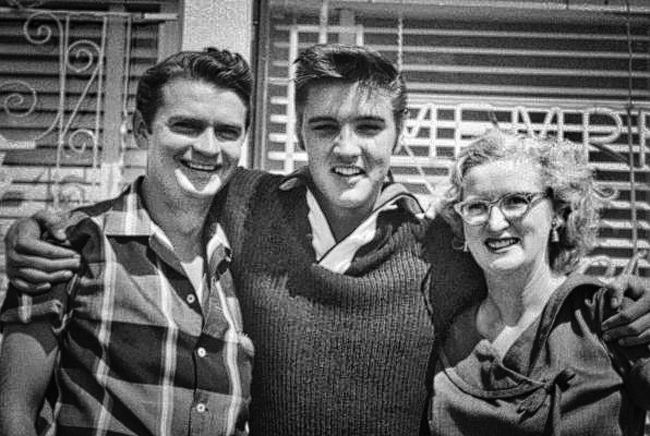
Elvis with WREC radio show host Marion
Keisker and record producer Sam Phillips.
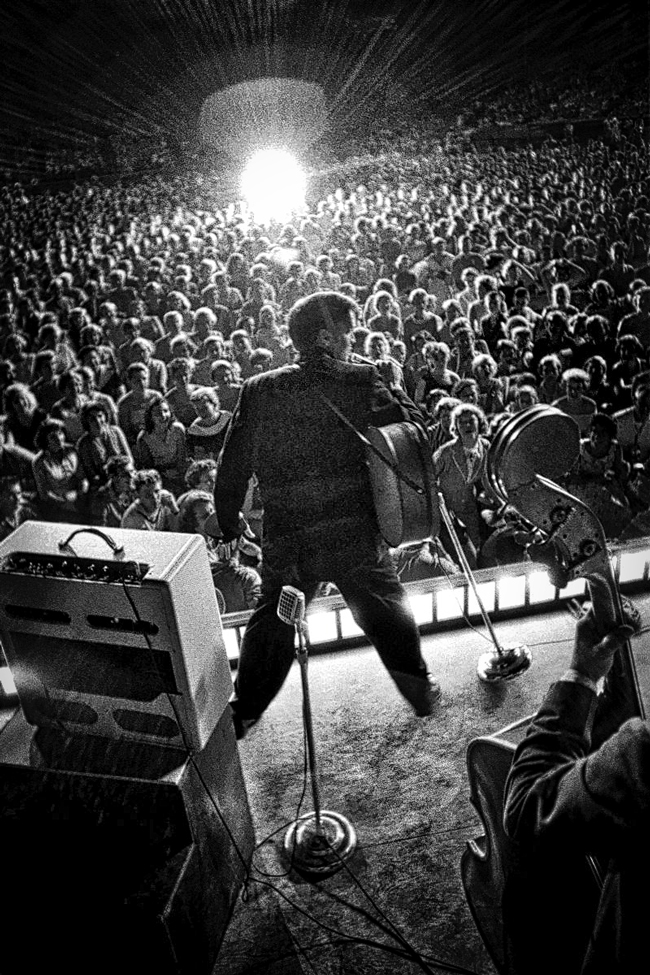
Elvis onstage at Russwood Park in Memphis in July 1956.
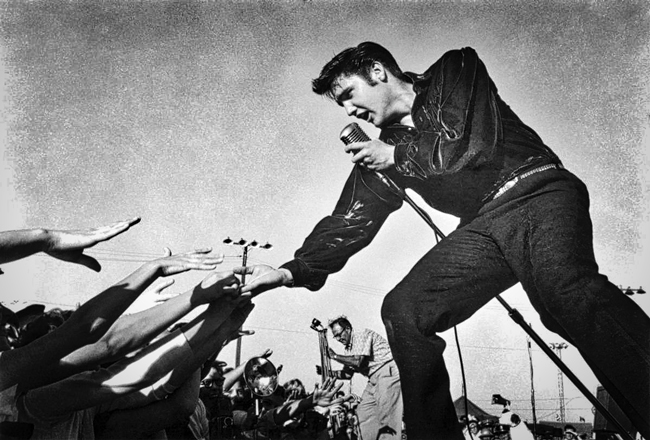
Elvis plays a homecoming concert at the
Mississippi-Alabama Fair in Tupelo, Mississippi in 1956.
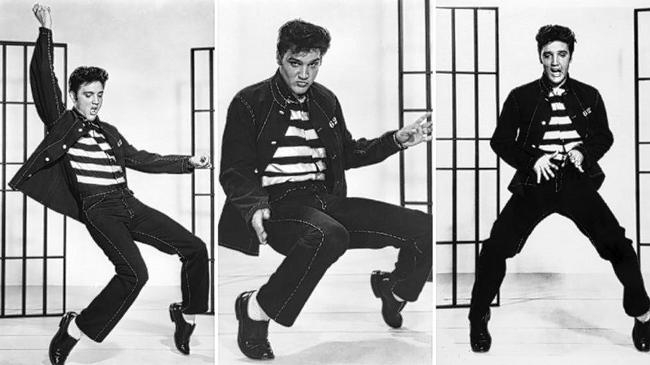
"Naw, sir," Elvis said to a journalist. "I don't like them to call me Elvis the Pelvis. It's the most childish expression I ever heard from an adult. And another thing… my pelvis has nothing to do with what I do. I just — I get rhythm with the music. I jump around to it because I enjoy what I'm doing. I'm not trying to be vulgar, not trying to stimulate [sic] sex. I just do a lot of wigglin' and quiverin', but I never do a bump or grind. I can't sit still when I sing, so the kids can't sit still."
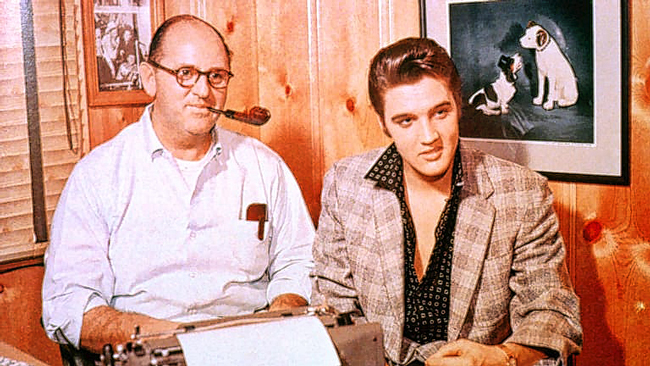
Colonel Tom Parker managed Elvis’s career from 1955 to 1977, overseeing almost every aspect of the star’s life. A “colonel” in honorary terms only, he was a shrewd, showman-like figure who learned how to sell acts by working for carnivals; he often referred to Presley as “my attraction.”
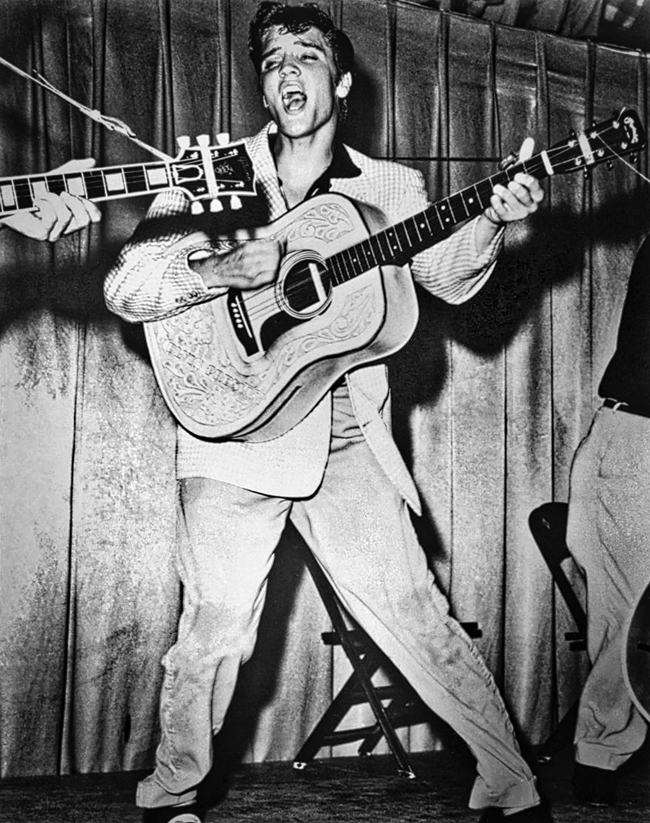
Elvis Presley performs in 1956 in a photo that was used for his first RCA Victor album cover.
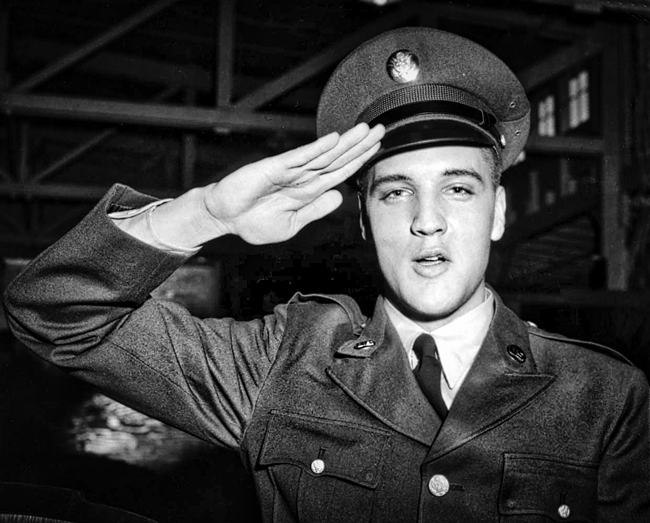
When Elvis was drafted into the Army in 1957, questions were rampant: Could the most famous person in the United States be useful, or would he just get in the way? Wouldn't it be better if he traveled and entertained the troops? Would he have to lose his ducktail haircut, which had stolen the hearts
of so many young women?
The different service branches offered him cushy jobs. The Navy proposed creating an "Elvis Presley company" made up of his Memphis friends. The Air Force wanted to use him as a recruiting model. The Army offered to have him
only play concerts for the troops.
Presley chose to serve.
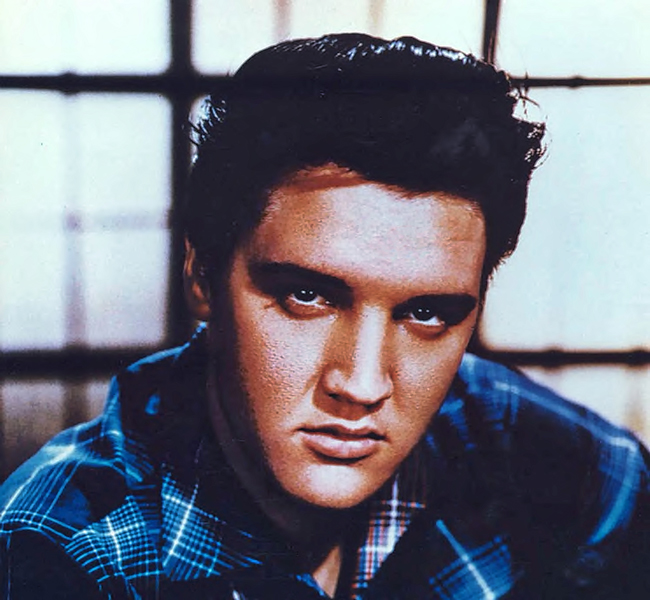
Elvis in a publicity still from the 1956 movie “Love Me Tender.” While the star's early Sun Studio days were still celebrated by his aficionados, the heavy commercialization of his brand (as it would be called today) was already in full swing.
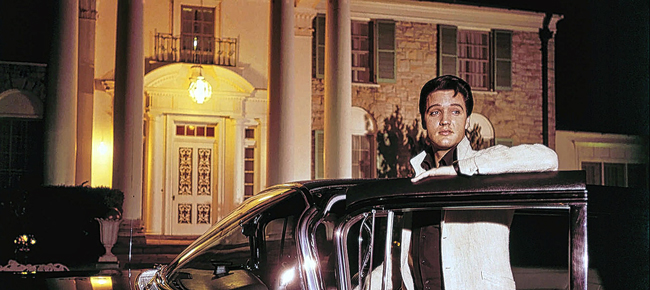
In March 1957, when Elvis was a rising star looking for a suitably grand home that could give him the privacy he needed, he bought the sprawling property known as Graceland. Now a National Historic Landmark, Graceland is the second most-visited home in the United States, with more than 700,000 visitors annually, surpassed only by The White House.
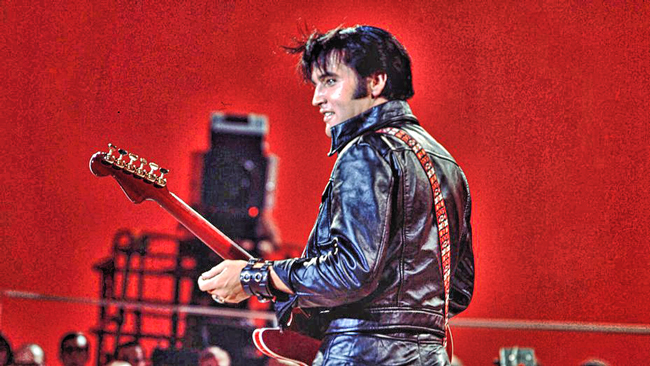
Elvis captivated audiences during
his iconic 1968 NBC Comeback Special.
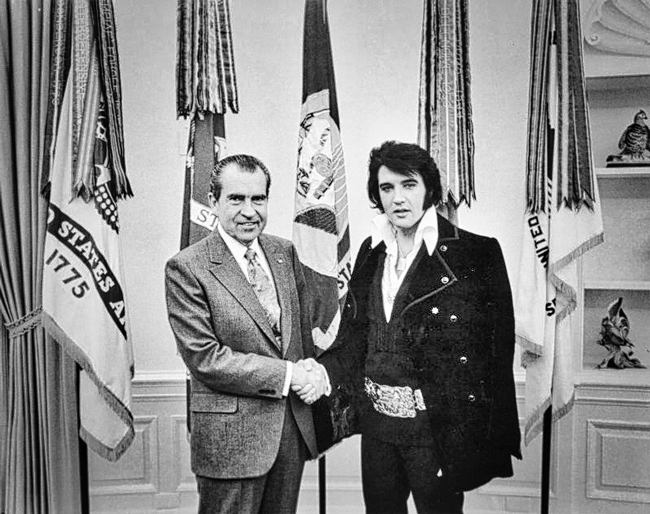
When this famous photo of Elvis and President Nixon was taken, both men were at the top of their careers. Presley was in the middle of a successful comeback, selling out shows in Las Vegas. He'd just been nominated one of the country’s Ten Outstanding Young Men by the U.S. Junior Chamber — it was recognition he was proud to receive. Nixon, meanwhile, had not yet been tainted by Watergate, and was riding a wave of popularity for vowing to get America out of Vietnam and desegregate the nation's schools.
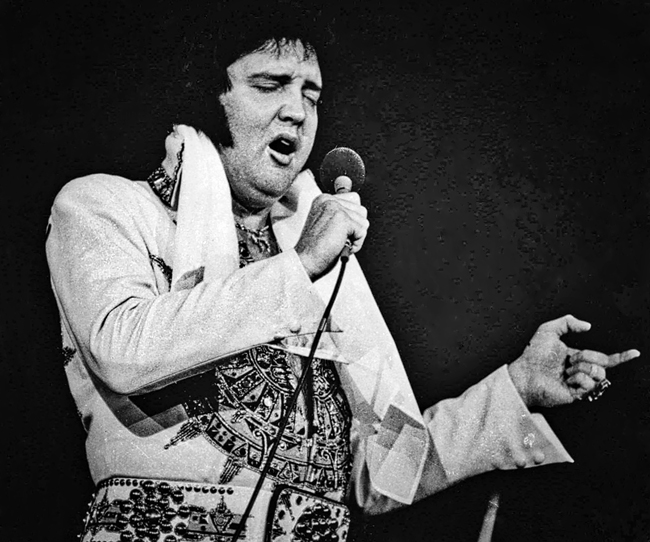
Elvis performs in Providence, Rhode Island,
in May 1977, less than three months before his death.
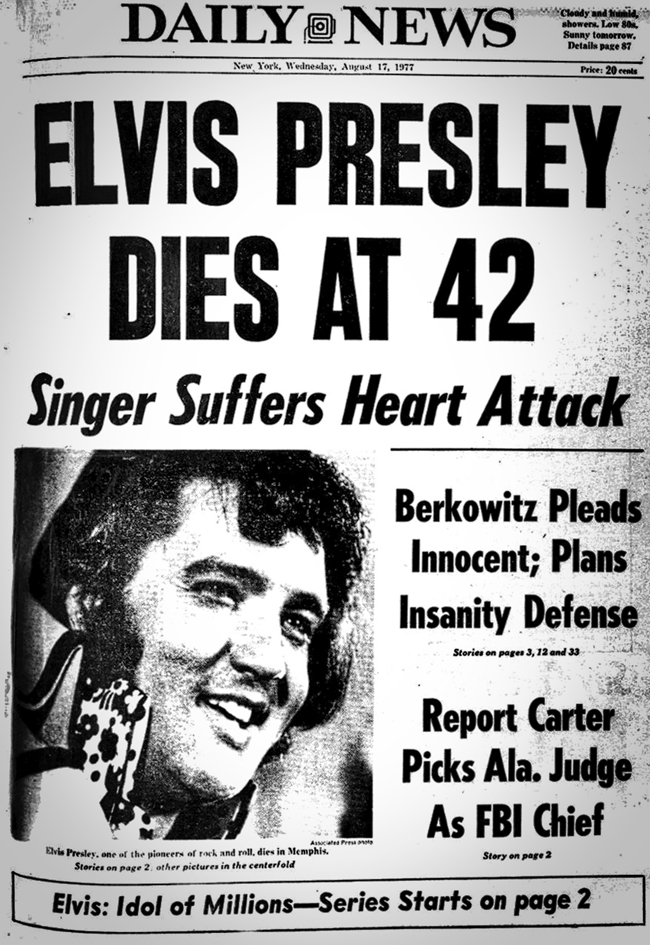
The front page of the New York Daily News announces his death.
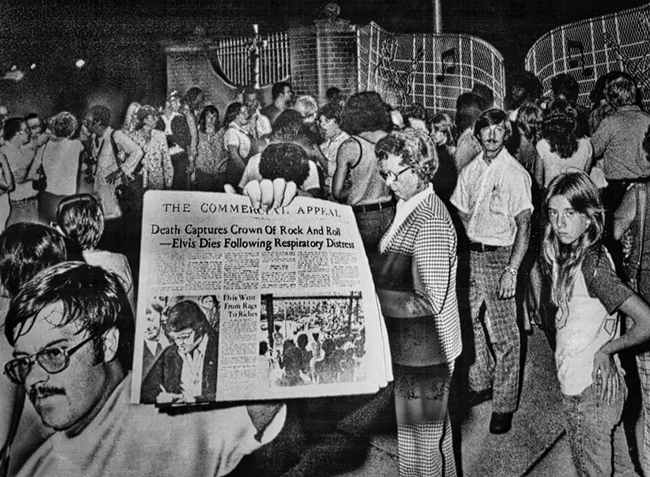
A man outside the gates of Graceland holds up a newspaper announcing Elvis' death. Mourners stayed all night outside the singer's mansion.
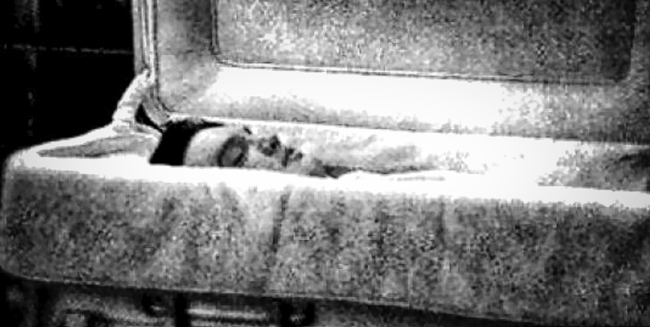
Robert Kendall was Elvis’s funeral director at the Memphis Funeral home who arranged all the procedures for the burial of the King. Having arranged the funeral service for Gladys Love Presley, Elvis’s mother, Kendall thought it only appropriate that Elvis be buried in an $8,000 casket identical to the one Gladys was buried in. The copper lined casket also provided a two-by-four-inch stainless steel cylinder for identification purposes in the event the remains ever need to be exhumed.
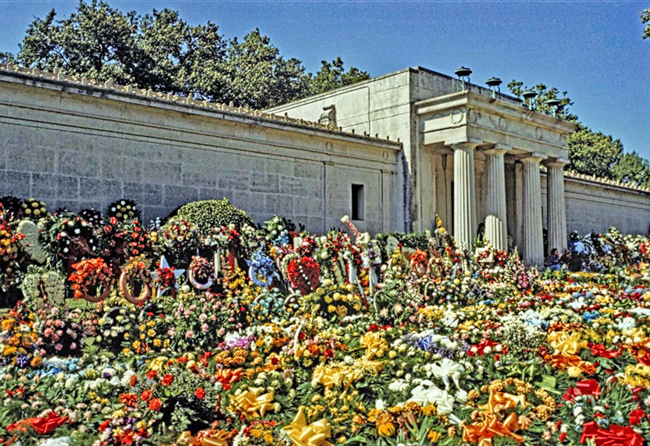
Flowers are piled up outside the mausoleum at the Forest Hills Cemetery in Memphis ahead of Elvis's burial.
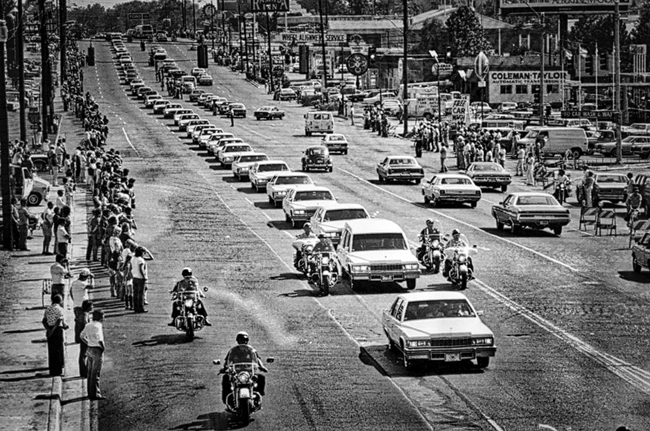
The hearse carrying Elvis drives along Elvis Presley Boulevard on the way to Forest Hills Cemetery.
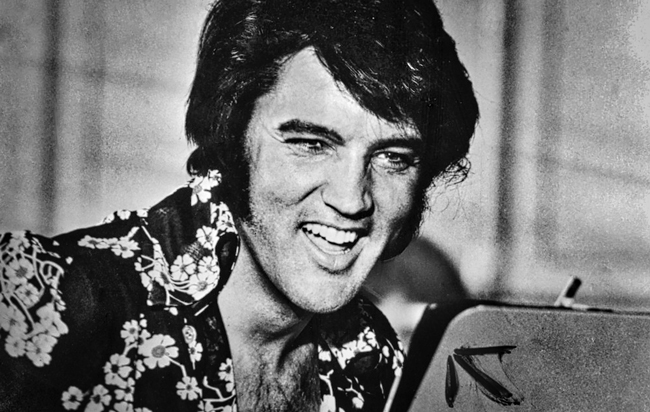
Official records show that Elvis had a heart attack and passed away on August 16, 1977; but some fans have always been adamant that he actually faked his own death, so that he could enjoy a more relaxed life free of the burden of stardom.
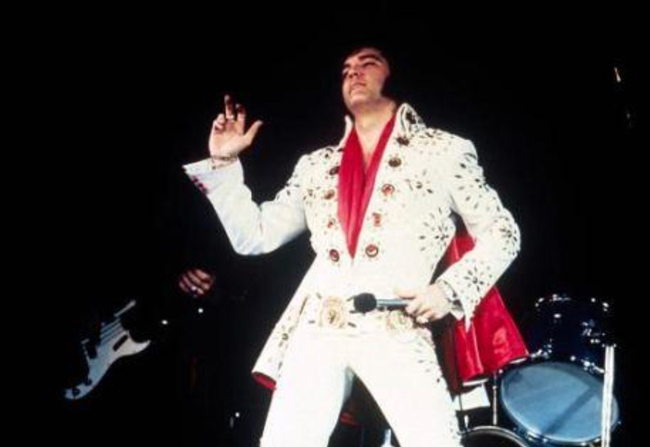
Soon after Elvis's reported death, a man strongly resembling him supposedly travelled to Memphis airport and purchased a one-way ticket to Buenos Aires, Argentina. He gave the name ‘Jon Burrows’, a known alias Elvis used when booking hotels.
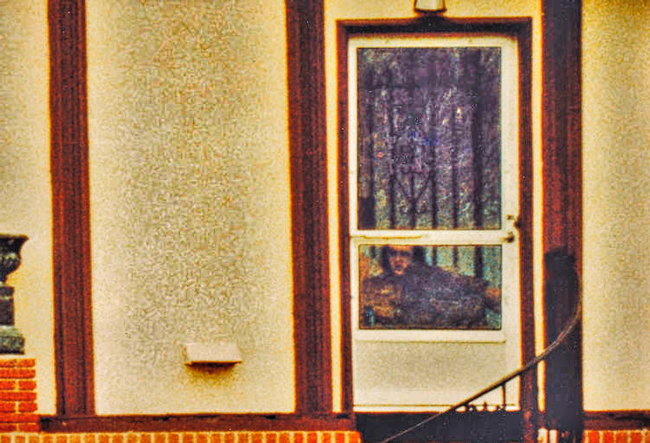
Imagine you're 42 years old and one of the most famous people to ever walk the planet. Maybe you'd consider faking your own death to live out the rest of your life in peace, away from the constant spotlight and scrutiny of the people. This picture taken in the pool house behind Graceland’s Meditation Gardens four months after the death of Elvis shows a man seated behind a screen door who does indeed look like him from afar…
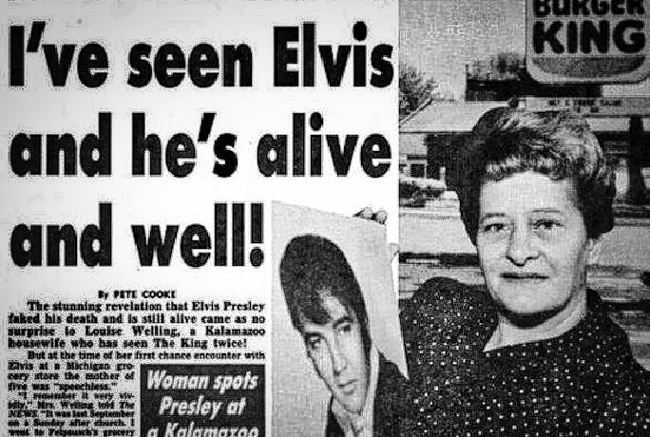
"Woman spots Presley at a Kalamazoo Burger King" … The stunning revelation, that Elvis faked his death and is still alive, came as no surprise to Louise Welling, a Kalamazoo housewife who said she saw The King twice, at a Kalamazoo Burger King on 760 W. Michigan Avenue. In her defense,
Elvis was a big fan of Burger King.
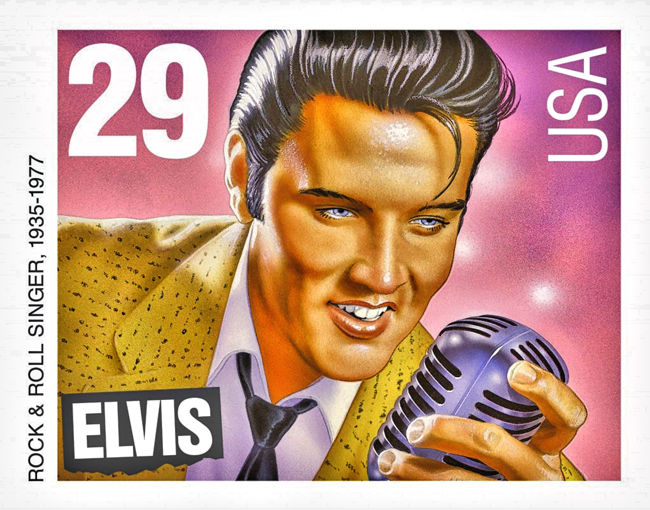
In 1992, the U.S. Postal Service conducted a nationwide survey to determine which face of the late Elvis Presley should be immortalized on a 29-cent stamp: a 1950s Elvis with a pompadour and tweed jacket, or a 1970s Elvis with mutton chops and a jeweled collar. By a 3-to-1 margin,
America voted for the younger Elvis.

Gail Brewer-Giorgio is an author from Gainesville, Florida, whose works have speculated about the possibility that Elvis may have faked his death. She began her career with a work of fiction, “Orion,” which she wrote in 1978. It told the story of a famous musician who faked his own death to escape
the fame he'd achieved.
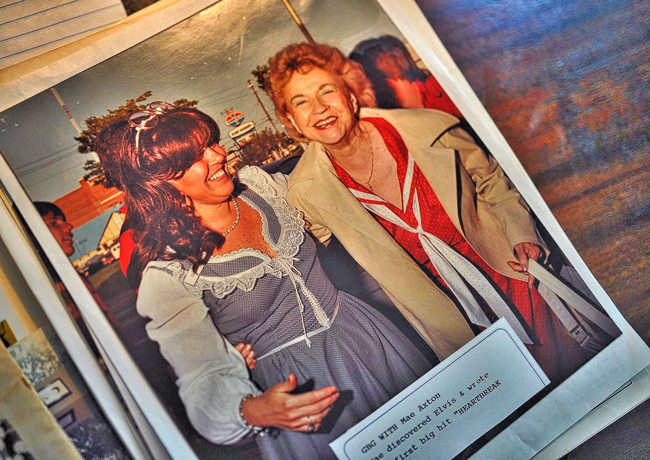
Gail Brewer-Giorgio became friends with Mae Axton, a musician who helped write Presley’s popular song “Heartbreak Hotel.” When Axton heard about Elvis's death, she called Presley's father Vernon. "What's going on?" she asked. Vernon said, ‘Don’t even come to the funeral, it’s not Elvis in the coffin.’”
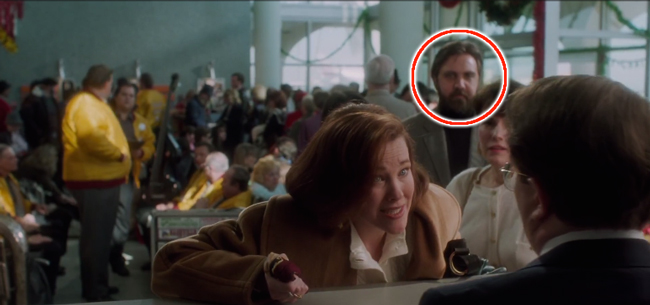
There is a scene midway through the film Home Alone, where Catherine O'Hara's character, exhausted from trying to get back to Chicago to reach her son whom she forgot and left at home, barters with an airline employee over a ticket counter in the airport. An impatient bearded man in a sports coat and turtleneck watches from behind her in line. This man, many believed, was Elvis.
Author Kenny Biddle investigated and found the man to be Gary Richard Grott, who died of a heart attack in February 2016. Biddle located Grott's son, Roman, who explained that his father was indeed the extra in the airport scene of Home Alone, and that he had known director Chris Columbus personally.
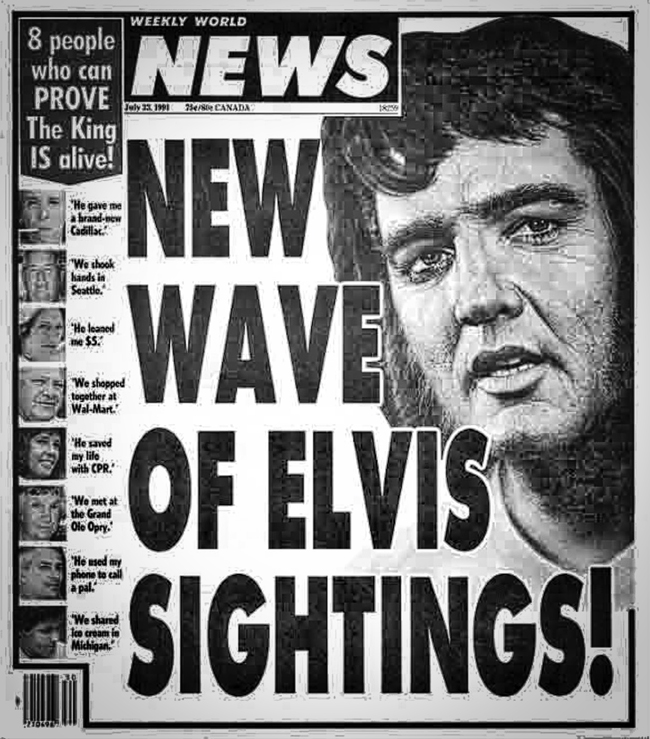
Paranormal researcher Ben Radford responded to the Home Alone Elvis sighting believers: "Why fake your death and then turn up as an extra in a popular movie? How could the cast and crew have failed to notice the presence of one of the most famous figures in the world? Even if he looked very different could he have disguised his voice and mannerisms?" Radford was challenged to find the actor who played that part to prove it wasn't Elvis. He countered that the burden of proof was on the person making the claim.
Radford is right, but the Elvis tabloid
feeding frenzy cannot be stopped by mere reason.
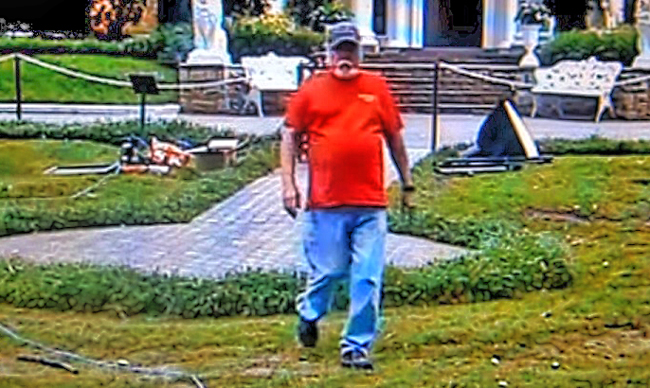
In the summer of 2016, video of a Graceland groundskeeper who was purported to be Elvis shook up the internet. In the clip, a gray-haired fellow in a baseball cap and Elvis Week T-shirt fusses with some wire and holds up two fingers — apparently some type of numerological clue — as he walks past the camera…
He was later identified as Bill Barmer, an employee
of Elvis Presley Enterprises, which runs Graceland.
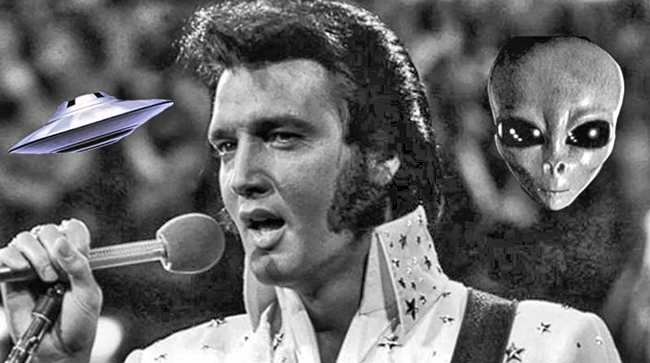
According to History.com, Elvis claimed many connections with extraterrestrials. When he was born his family and family doctor remember an unexplainable light beaming over the family home. Elvis recalled that when he was eight years old he was telepathically visited by aliens who showed him a future vision of "a man wearing a white suit singing to a crowd. He also said he had seen many UFOs in adulthood.
Celebrity alien stories
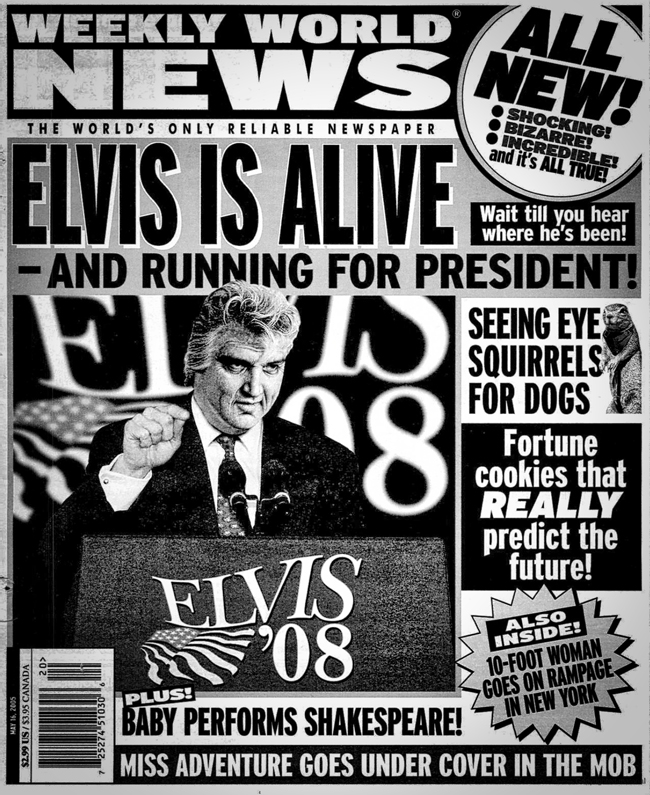
The Weekly World News adds its own
distinctive fuel to the Elvis tabloid dumpster fire.
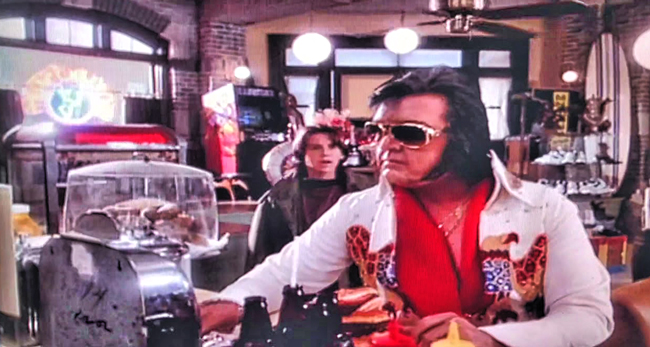
Elvis, played by actor Steve Peri, made an appearance in the short-lived 1991 NBC TV series Eerie, Indiana.
.jpg)
In this screen capture from a documentary narrated by actor Bill Bixby, he debates the case (with Elvis impersonator Johnny Harra) that Elvis faked his death in 1977 and could still be alive…
Directed by Bill Raymond
Written by Gail Brewer-Giorgio
IMDb web page
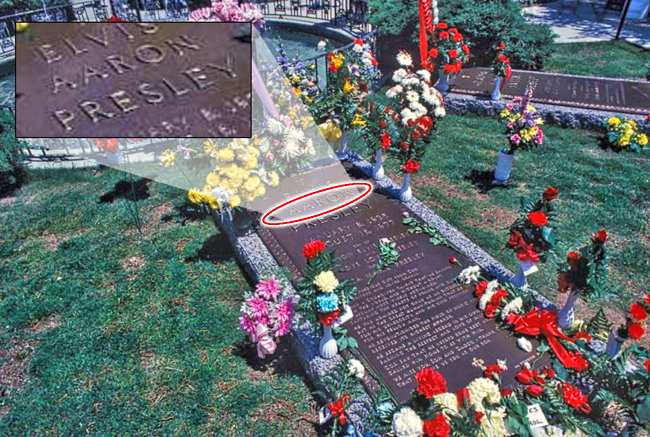
On Presley’s gravestone, his middle name Aron is spelt Aaron. Although Aaron is Elvis’ genuine middle name — allegedly either his parents or he wished to change it to Aron, as a possible tribute to Presley’s stillborn twin, Jesse Garon Presley; but some fans believe the misspelling served another purpose, as a subtle hint to those in the know that Elvis faked his own death.
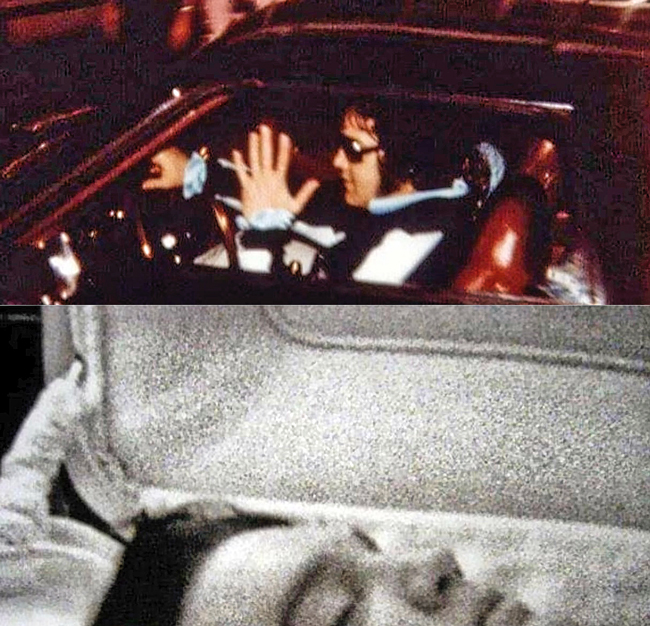
This message in all caps was recently posted on a social media site devoted to all things Elvis:
"NOTICE THAT THE LAST KNOWN PICTURE OF ELVIS TAKEN IN THE EARLY MORNING OF AUGUST 16, 1977 LOOKS LIKE A 70'S ELVIS! YETT IN THE COFFIN PHOTO, WE SEE ELVIS LOOKING LIKE A 50'S ELVIS!! IT OBVIOUSLY THAT IT IS NOT ELVIS IN THE COFFIN! ELVIS IS ALIVE!"
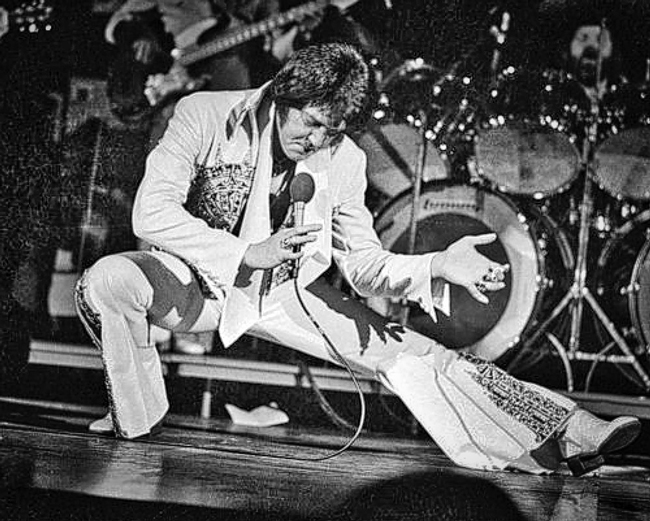
Elvis Presley performs in concert at the Milwaukee Arena on April 27, l977 in Milwaukee, Wisconsin in this photo. One of the biggest theories on why Presley may have faked his death is because he had to in order to escape the mafia. Gail Brewer-Giorgio, the author of the 1988 bestselling book Is Elvis Alive, recalled how she pored through thousands of FBI documents to come to the conclusion that Presley was an American hero who had to go into witness protection.
“Do I know if Elvis is alive today? No, I don’t know,” she said.
“But I know he didn’t die on August 16.”
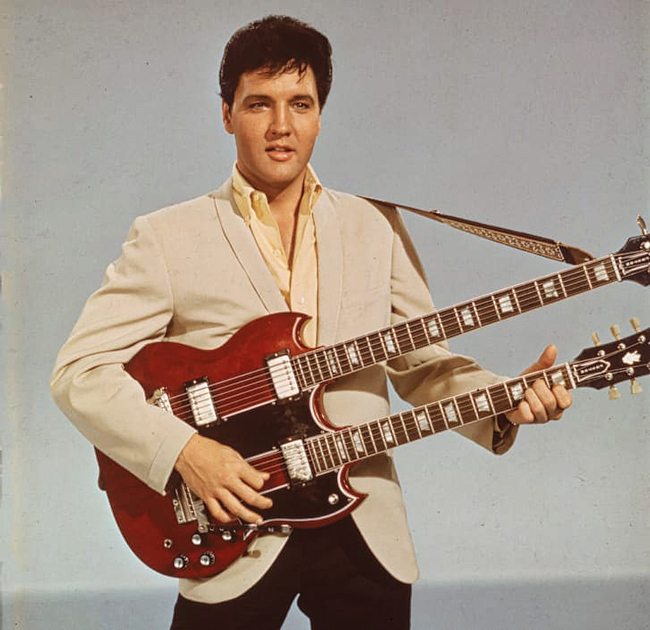
“Elvis is alive” theories can’t go on forever. The man would now be in his 80s, and the oldest person on record only lived to 122. That means we have perhaps another 40 years of stories about the King as an elderly man who’s been in hiding since the Carter Administration before the implausibility factor reaches critical mass.
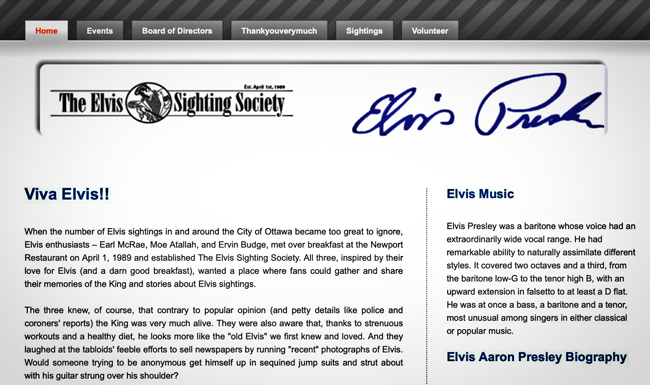
The Elvis Sighting Society — whose central tenet is that The King is alive and well — has a revolving membership and a very haphazard meeting schedule, which is mostly concerned with fundraising activities for community causes in Ottawa, Canada, where it was founded.
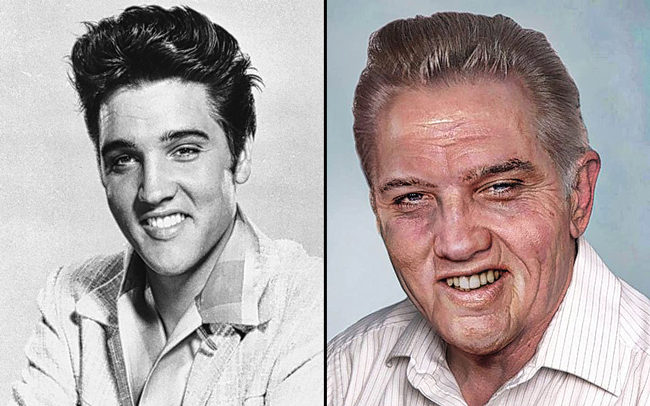
A Photoshopped image of an older Elvis — presumably
after he's overcome his weight problem.
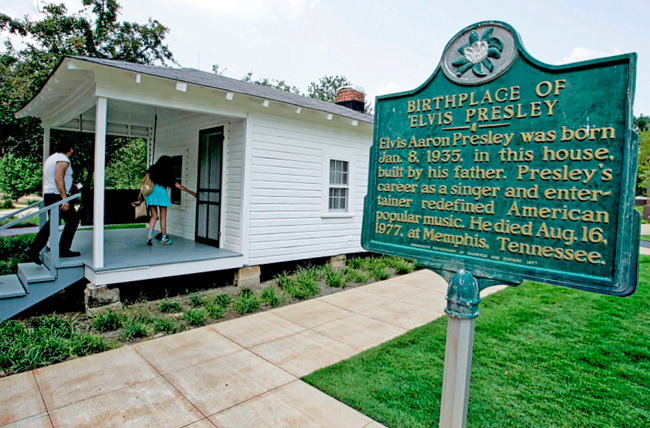
Fans walk into the small home where Elvis was born in Tupelo, Mississippi. The two-room shack is still there. The East Heights Garden Club looks after it. They make sure the grass is mowed and the bushes are trimmed and the paint job is respectable. They open the door for a few hours each afternoon, and you can walk through the tiny rooms for a quarter.
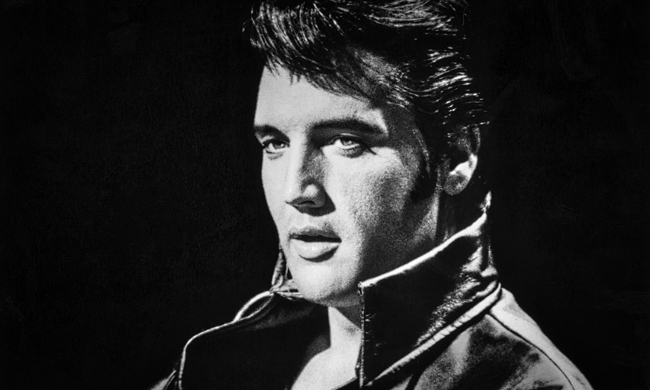
According to legendary composer and conductor Leonard Bernstein, Elvis Presley was the greatest cultural force in the 20th century. When someone challenged him, Bernstein said: “He introduced the beat to everything and he changed everything – music, language, clothes, it’s a whole new social revolution – the ’60s come from it.”

Elvis is without question the most widely-sighted celebrity despite being ostensibly deceased. His image is one of the most recognizable in the world.
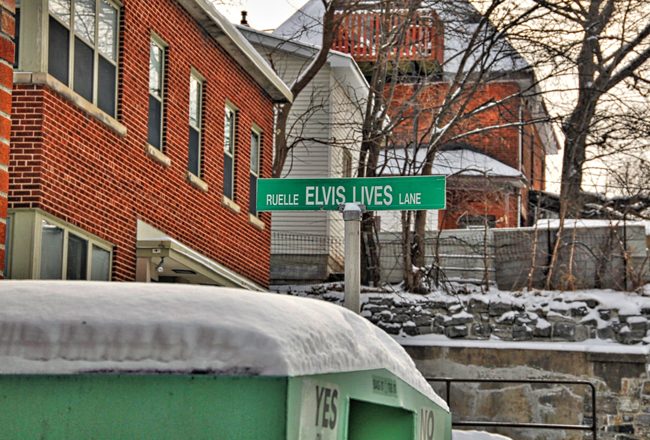
in October 1991, the King was honored by the City Council of Ottawa as they voted 11 to 2 in favor of calling a previously unnamed street Elvis Lives Lane. It runs right behind "Moe's World Famous Newport Restaurant" — or, as it's sometimes called, Graceland North.
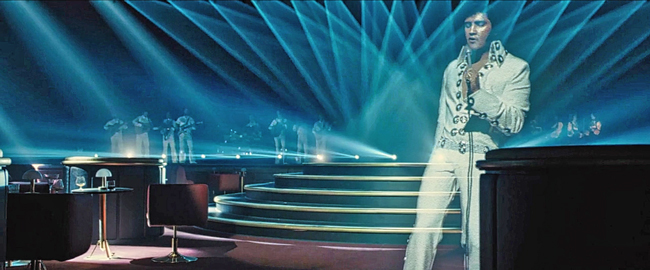
The King has now been dead as long as he was alive, but his fandom is alive and well and bigger than ever. Sadly, many will never know what it was like to see Elvis Presley perform live… But what about a hologram tour?… Presley's former wife Priscilla has her doubts about whether the technology is good enough yet, but is open to the idea… “(It's) very difficult because the way they do holograms is putting bits and pieces together. I haven’t really seen it that perfected. I’m not saying it’ll never be around because it may progress on everybody really. But right now it’s not in progress.”
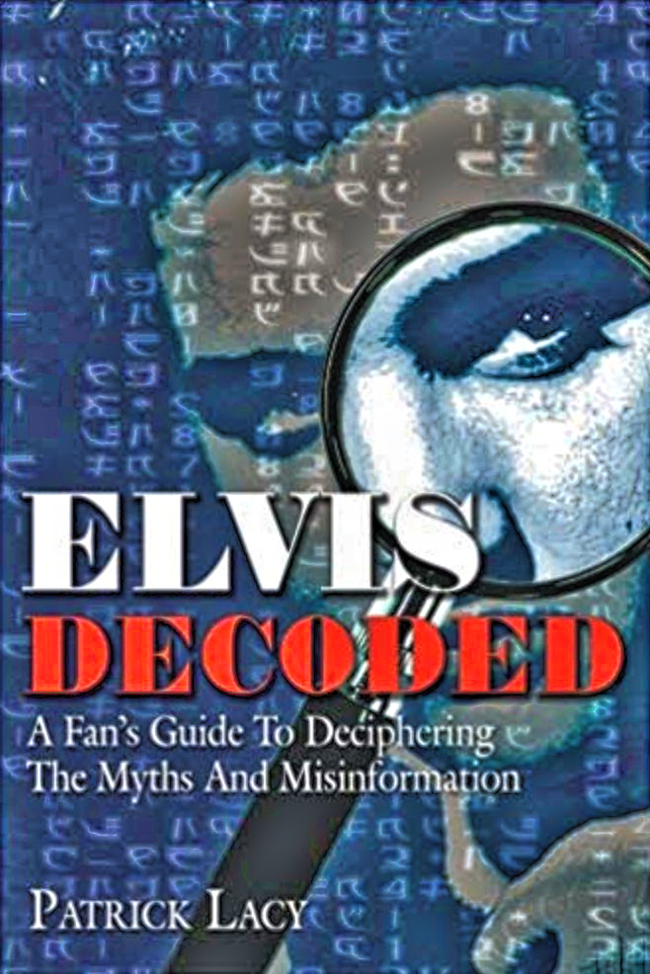
Elvis Decoded... Author Patrick Lacy has written a book that is long overdue: a detailed, in-depth examination of the facts and figures that permeate the many Elvis books, websites, articles, and public boards. He sorts through all the information and puts things in proper perspective. Elvis Decoded also covers scores of other questions and topics that have been largely ignored or mishandled over the past 29 years. The author offers a unique perspective on the toughest questions and the most complicated issues in the Elvis Universe, and explains how things got so confusing. Elvis Decoded - A Fan's Guide to Deciphering the Myths and Misinformation is presented in a Q&A format, and offers an examination and comparison of the numerous Elvis source materials. Also included in the book is the author's own research into other topics that have remained largely unaddressed since Elvis's death in 1977. More information can be found at the
companion webpage.
Rave reviews for Elvis Decoded: A Fan's Guide...
"...Lacy has an uncanny ability to take these different versions of the same event and, without any sleight of hand, make the real truth appear, as if by magic, using the simple power of reasoning and elimination... The author's sincere search for the truth and his years of unbiased Elvis research shine through...I highly recommend this book to any Elvis fan."
— Jim Cox, co-author, with Nancy Rooks (Elvis's maid), of "Inside Graceland"
"Finally — a book on Elvis Presley that is not only warranted but sorely needed. Author Patrick Lacy sifts through a mountain of information and dissects the singer's life and death with the precision of a surgeon and the analytical mind of a forensic scientist..."
Amazon web page
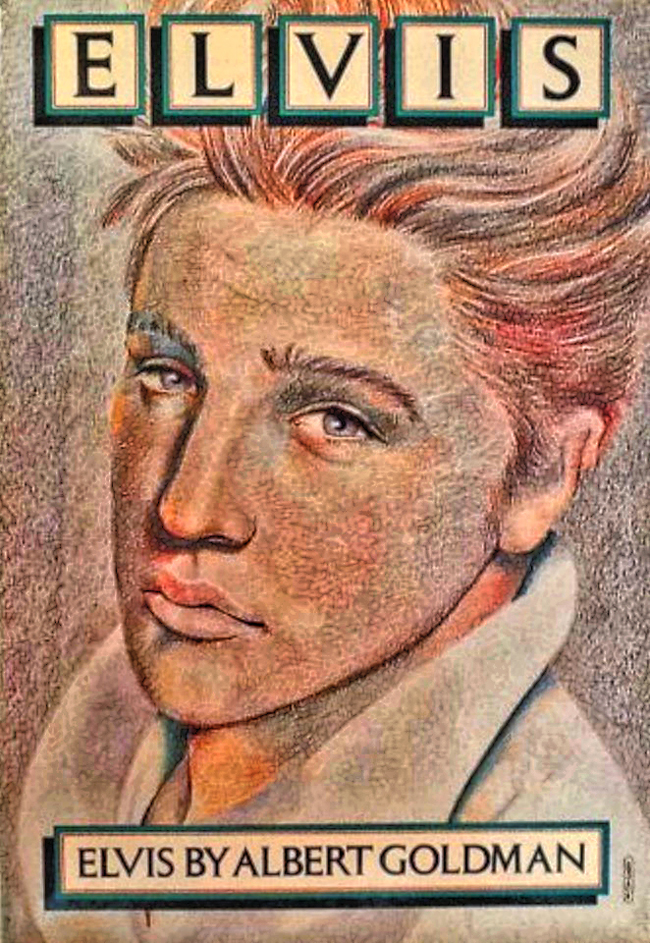
"It is (author Albert) Goldman’s purpose to entirely discredit Elvis Presley, the culture that produced him, and the culture he helped create — to altogether dismiss and condemn, in other words, not just Elvis Presley, but the white working-class South from which he came, and the pop world which emerged in his wake."
— Historian and cultural critic Greil Marcus, on the bestselling book "Elvis" by Albert Goldman.
Amazon web page
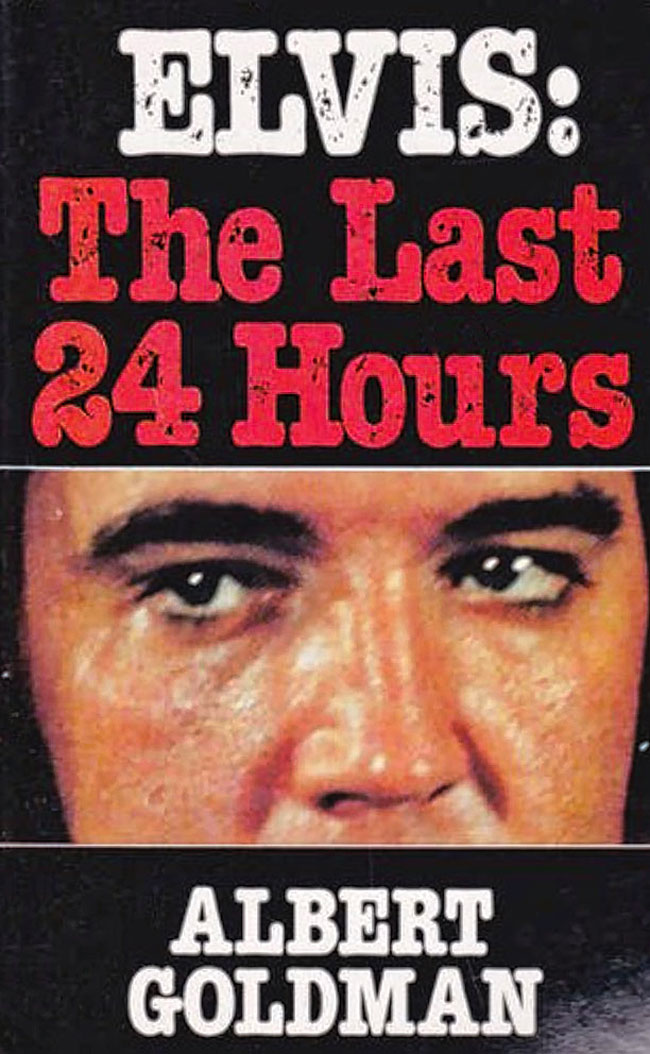
In 1990, Albert Goldman published his second Elvis book, Elvis: The Last 24 Hours, which covered the circumstances and events of Presley's death, arguing that the singer committed suicide. The book drew some attention for its sensational thesis but was otherwise largely ignored.
Amazon web page
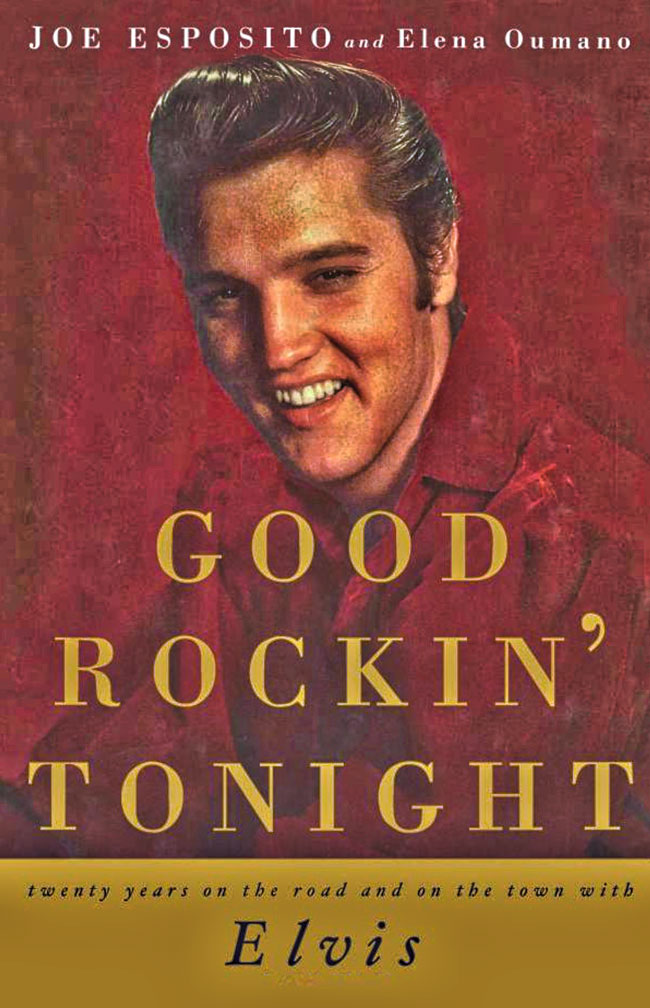
Author Joe Esposito met Elvis Presley in the army. In 1960, when both were discharged, he accepted Elvis's offer of a job, becoming one of the "Memphis Mafia," the inner circle of friends and employees who went virtually everywhere with the King until his death in 1977. With freelance journalist Oumano, Esposito writes of a puerile fantasy lifestyle, the chief pleasures of which were boyish pranks and the pursuit of women. Elvis emerges as both charmingly naive and a tyrannical prima donna, while his much-maligned manager, Colonel Parker, was, Esposito maintains, simply a shrewd businessman who cared about his protege's best interests. Esposito soft-pedals some of the more controversial aspects of Presley's life, e.g., his drug abuse and womanizing, but on the whole the singer portrayed in these pages, one of the most mythologized figures in American culture, seems human and perhaps even likable.
Amazon web page
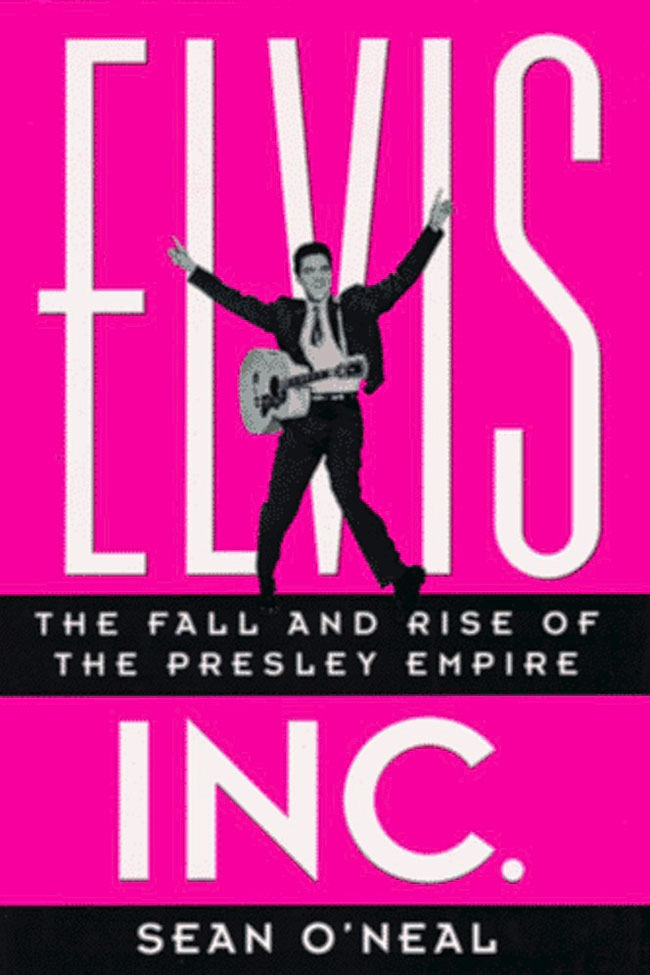
Elvis Presley made more money in his lifetime than any other performer in history. Yet, when he died, his estate was nearly bankrupt. In Elvis Inc., author Sean O'Neal reveals the abysmal condition the estate was in when Elvis died, and how Elvis Presley Enterprises turned the estate into the huge success it is today, raking in more than $100 million a year. Here is a glimpse of what's revealed in Elvis Inc.:
• Why the second floor of Graceland is off-limits to the public
• Why Elvis never toured outside the United States
• How much Elvis' relationship with Colonel Tom Parker cost him
About the Author:
Sean O'Neal is an acknowledged Elvis expert and collector of Elvis memorabilia. He has been studying Elvis Presley's life and music for over twenty years.
Amazon web page
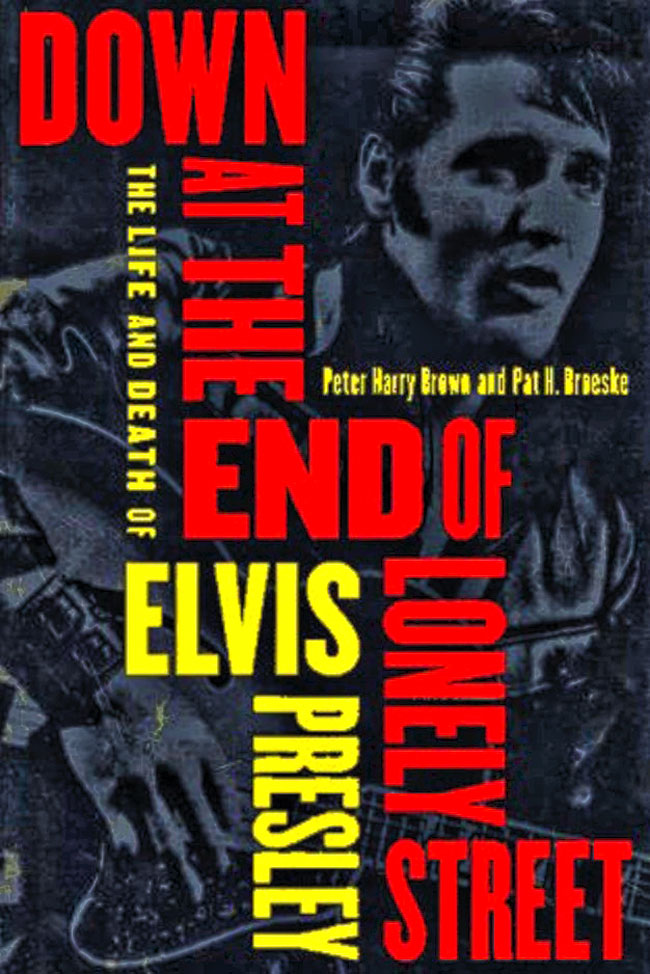
There is an almost Shakespearean tragic fate to Elvis's life: magnificent talent and charisma given to a man who lacked the spiritual capacity to handle the wealth, fame and women wisely and well. And thus the very things he strove to attain, despite his faith in Jesus Christ, destroyed him. The author suggests that Elvis Presley never recovered emotionally or spiritually from the death of his mother. "Down at the End of Lonely Street," is not an Albert Goldman hatchet job (Goldman was thoroughly antagonistic to Presley) but on the other hand, this book is not an encomium either. It does not explore Elvis in a cultural context as does Joel Williamson's impressive "Elvis Presley: A Southern Life," but if one wants a reliable, interesting encapsulation and summary of Elvis Presley's life condensed from other well known sources into one biography, "Down at the End of Lonely Street" is a solid choice.
Amazon web page
banner-magic-milwaukee-promo-850x600
src="../images/elvis/Book-Being-Elvis.jpg" alt="" width="650" height="auto"
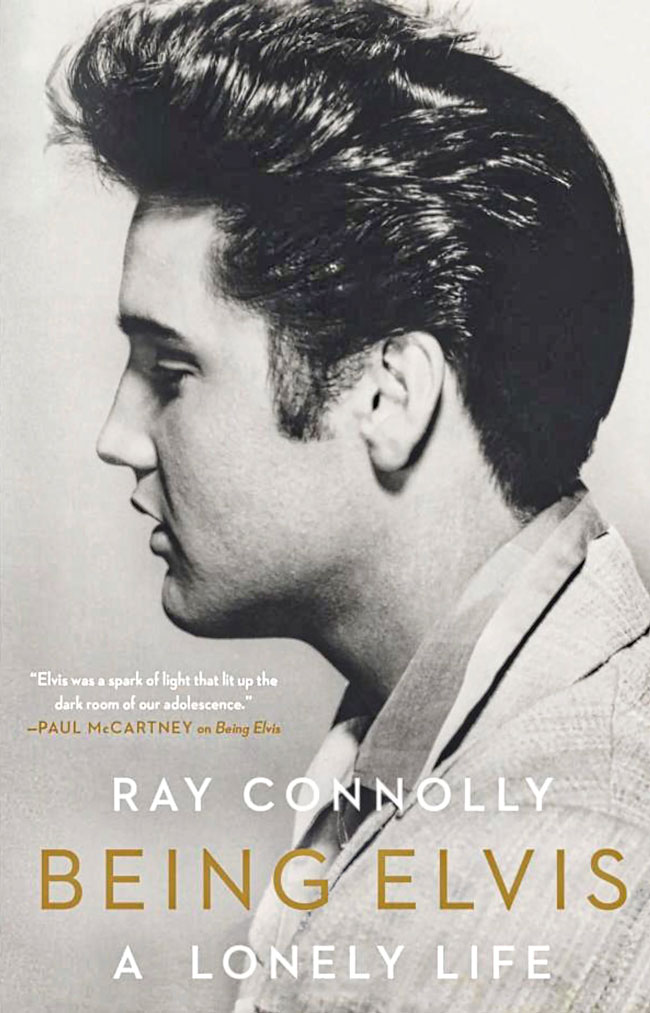
Elvis Presley is a giant figure in American popular culture, a man whose talent and fame were matched only by his later excesses and tragic end. A godlike entity in the history of rock and roll, this twentieth-century icon with a dazzling voice blended gospel and traditionally black rhythm and blues with country to create a completely new kind of music and new way of expressing male sexuality, which simply blew the doors off a
staid and repressed 1950s America.
In Being Elvis veteran rock journalist Ray Connolly takes a fresh look at the career of the world’s most loved singer, placing him, forty years after his death, not exhaustively in the garish neon lights of Las Vegas but back in his mid-twentieth-century, distinctly southern world. For new and seasoned fans alike, Connolly, who interviewed Elvis in 1969, re-creates a man who sprang from poverty in Tupelo, Mississippi, to unprecedented overnight fame, eclipsing Frank Sinatra and then inspiring
the Beatles along the way.
Amazon web page
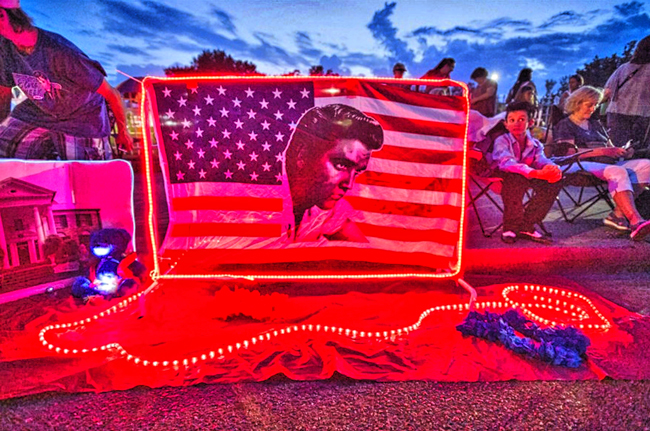
Fans (many of them born after Elvis passed away) gather for a candlelight vigil in front of Graceland on August 15, 2017, the night before the 40th anniversary of his death.



































.jpg)



















